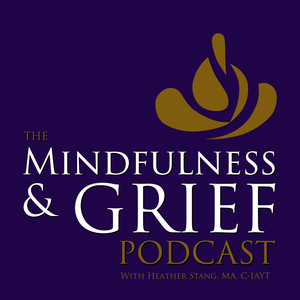
The Mindfulness & Grief Podcast
Heather Stang, MA, C-IAYT
Compassionate Support for Life After Loss
- 47 minutes 23 secondsHope Is a Bright Star: Finding Comfort and Peace After the Death of a Child
When Faith Wilcox’s daughter Elizabeth began to complain about knee pain, her doctors thought it was just growing pains and she would be fine. As her pain continued, she was diagnosed with a rare bone cancer that affects pediatric patients.
Through 10 months of treatment, Elizabeth remained positive and supportive of the other patients. Ultimately, Elizabeth passed away just one year after her diagnosis. In her grief, Faith was able to find moments of comfort and peace despite the things that were beyond her control.
Nature has always been restorative for Faith. Walks in the woods and time on the beach helped restore her mind and spirit. She also leaned into her circle of friends, who provided additional support.
Faith discovered one of her biggest relief strategies when she started journaling, after her therapist recommended she start writing to help get out some of her bottled-up feelings. Faith has since written multiple books, including Hope Is a Bright Star: A Mother’s Memoir of Love, Loss, and Learning to Live Again and has started a journaling program to help others who are struggling with grief.
23 July 2021, 3:48 pm - 1 hour 2 minutesSome Light at the End: Your Bedside Guide for Peaceful Palliative and Hospice CareBeth Cavenaugh shares with us her personal experience as a nurse-turned-hospice worker at the request of her mom during her mom’s final stage of life. Beth talks about her love of her work with families and patients and what caregivers need to think about during such a difficult period of time.
Hospice is a service that provides physical and emotional support for someone who is in their last six months of life. Hospice is a comprehensive team of support personnel that includes family members, healthcare workers, a social worker, chaplain, and a bereavement specialist. A nurse will come in and check on the patient multiple times a week to make sure their pain and symptoms are being managed and the patient is as comfortable as possible. A social worker and bereavement specialist can help you and your family members with some of the tough questions that come along with end-of-life care.
Beth's new book, Some Light at the End, details helpful strategies for those whose loved ones have a terminal illness or have recently passed. She can speak to:
- Mental wellness: Strategies to counteract anxiety, panic, and depression while living in hospice care for both those dying and their loved ones.
- Handling grief: Lessons from a hospice expert who has seen countless people through grief, and tips for your personal journey.
- Hospice 101: While in the early stages of grief, it's impossible to research all of our options. Beth details the questions we don't even know we need to ask and how to advocate for ourselves.
- Mobilizing: Hospice care happens at lightning speed. Beth details each step to save us from becoming overwhelmed and stressed.
BIO
Beth Cavenaugh is a certified hospice and palliative care nurse and educator with over 14 years of experience in caring for terminally ill patients. She has been a registered nurse for over 24 years and holds a bachelor's degree in nursing from Creighton University. Beth has supported hundreds of patients and their families at inpatient units, in-home settings, and behind the scenes in hospice care. Compassion, patient autonomy, and transparent communication are at the core of her care philosophy. Beth hopes to demystify death and dying so this powerful moment will be embraced as a normalized and celebrated life event. She continues to work in hospice and has a private reiki practice to support physical, emotional, and spiritual healing for adults and teens. Beth lives with her husband in Portland, Oregon, where they have (almost) successfully finished raising their three kids. Learn more at BethCavenaugh.com.
8 July 2021, 2:00 pm - 1 hour 3 minutesSigns From Beyond: A Father's Journey Towards Peace
Until he met Patty Furino, bereaved father Dave Roberts didn’t believe that the signs he kept seeing were coming from his beloved daughter, Jeannine. But soon, everything changed. In this episode of the Mindfulness & Grief Podcast, Dave shares his journey of love and loss and how the signs from his daughter transformed from triggering waves of grief into joy, and how they remind Dave that Jeannine is still close. Dave and Patty describe how Jeannine speaks through her father’s new friend, fostering a deep continuing bond that allows Dave to live on after loss.
When The Psychology Professor Met The Minister is co-authored by our two guests, and written from Dave’s perspective and walks us through his evolution of putting aside his academic mind to being open to receiving messages from Jeannine. Patty has been his major supporter and guided him to honor and enjoy his memories but also be alive in the present.
28 June 2021, 12:00 pm - 49 minutes 37 secondsFatherless Odyssey: Navigating Both Biological & Step-Father Loss
In episode 50 of the Mindfulness & Grief Podcast, Reid Peterson shares his story of losing both father figures in his life and the grief that comes with living without those important people. Although he was not close to his biological father the way he hoped, Reid still grieves the relationship that he wished he had with him. After his loss, Reid found support through grief groups but wanted more consistent support. This led him to create a grief support app that offers daily audio messages for grief education.
17 June 2021, 12:00 pm - 58 minutes 16 secondsA Sherpa Named Zoi: How to Walk Through Grief & Live With Intention
In episode 49, bereaved father Eric Hodgdon explores how he leads a life of intention in the wake of incredible pain over the death of his daughter, Zoi, who died by suicide. He shares his fond memories of a loving and fun girl who was a sweet, supportive peer to those who knew her. Family, friends, and patients who traveled their mental health path alongside her all remember Zoi as a very special person.
11 June 2021, 3:00 pm - 1 hour 7 minutesThe Art of Visualizing Grief: Translating Pain Into Pictures
Ronald Mathias talks to us about his field of medical illustration: the art of taking complex medical procedures, descriptions, or concepts and turning them into something visual for ease of understanding. He spends most of his time translating traumatic injuries and building empathy for the pain someone has suffered into a visual medium for litigation. He is also tasked with the extremely difficult job of taking the unseen symptoms and turning them into visual representations.
For the cover of the book Superhero Grief, Ron designed the cover to help the reader understand the transformation that even Superheroes go through. Every person, superhero or not, goes through grief at some point in their lives. Each person has to leave something behind to transform into the new person that they have become. Superheroes are imperfect like us and can have trouble moving on from the trauma they have endured.
3 June 2021, 2:38 pm - 1 hour 10 minutesFrom Grief to Peace: Guided Journaling For Mindfulness & Compassion
The tables are turned as Heather Stang, the regular host of the Mindfulness & Grief Podcast, is interviewed by guest host Audrey Hughey about the new guided journal for grief, From Grief to Peace, which releases on June 1, 2021. Heather shares how she began journaling about her grief over her Uncle Doug's death in high school and the differences between free journaling and guided writing with prompts. Audrey shares how she processed her emotions over her ex-husband's death in her first thriller/novel.
From Grief to Peace is based on the Mindfulness & Grief System developed by Heather. It offers meditation and journaling exercises to initially help bereaved people cope with the pain of loss, and eventually rewrite their post-loss narrative, all while developing healthy lifestyle habits. The new book offers a holistic approach to life after loss, weaving in memorial and meaning-making activities with personal reflection and goals to help the reader-writer move forward, which is quite different from moving on. Heather relies on evidence-based approaches, contemporary grief research, and ancient practices rooted in yoga and Buddhism, and holds a master's degree in thanatology, the study of death, dying, and bereavement.
26 May 2021, 11:38 pm - 1 hour 6 minutesLeave Your Light On: Friendships & Continuing Bonds After Loss with Shelley Buck and Kathy Curtis
In episode 46, lifelong friends Shelley Buck and Kathy Curtis share their journey of childhood friendship, staying in touch through college, and the comfort that Kathy provided to Shelley following the devastating loss of her son, Ryder. Ryder was a talented musician and world traveler who continued to live his life to the fullest even after his Stage IV cancer diagnosis.
After Ryder’s death, Shelley felt extremely lost and unsure of her next steps in life. So Kathy helped Shelley write the book “Leave Your Light On,” inspired by a song Ryder wrote, to share Shelley’s journey through the process. The book is filled with letters, journal entries, poems, and memories. Shelley found that writing was very cathartic for her, and she hopes her journey encourages others.
20 May 2021, 12:00 pm - 58 minutes 18 secondsEmily’s Hope: Coping With Grief & Erasing The Stigma Of Overdose Loss
In episode 45, Angela Kennecke shares with us her story of losing her beautiful 21-year-old daughter, Emily, to overdose. Angela and her family were just a normal family. Emily was a gifted student and cheerleader. But Emily was struggling with one of the most common problems in America — addiction. Her sudden and unexpected death changed the lives of her family forever.
Through her grief, Angela wanted to keep Emily’s memory alive. She originally wanted to just display some of her daughter’s artwork at a local charity center. Fast forward to today and Angela now runs Emily’s Hope, a foundation that wants to remove the stigma of addiction, provide financial support for treatment seekers, and bring comfort to families who have lost a loved one to addiction.
If you’re looking for resources for yourself or a family member, please check out the resources that are available on the Emily’s Hope website.
6 May 2021, 1:22 pm - 58 minutes 15 secondsFuture Widow: Losing My Husband, Saving My Family, and Finding My Voice
In episode 44, we talk to Author Jenny Lisk about her experience of parenting and caregiving for her husband during his aggressive form of brain cancer and eventually becoming a single parent and widow. Jenny shares how she navigated her way forward after his passing and her calling to help other people who may be losing a spouse.
In Future Widow, Jenny goes behind the scenes of her journey through those tumultuous and heartbreaking months. She reflects on the community who showed her how to be an ally in a crisis, her search for guides on how to parent grieving children, and the dual reality of having to choose—and getting to choose—what her future will look like.
Jenny Lisk is an author, speaker, and host of the Widowed Parent Podcast, which has been featured in The Washington Post and ParentMap. On her “hundred dreams” list is riding a camel, milking a cow, and raising $44,000 for brain cancer research, in honor of her husband’s 44 years. The author of Future Widow: Losing My Husband, Saving My Family, and Finding My Voice, Jenny lives in Redmond, Washington, with her two teenagers. She is passionate about helping widowed parents increase their family’s well-being. You can download her free guides, What I've Learned About Widowed Parenting and How to be Helpful: Tips for Allies of Widowed Families.
https://jennylisk.com/memoir
27 April 2021, 12:00 pm - 58 minutes 18 secondsI HAD A Brother Once: Unmasking the Grief of Sibling Loss by Suicide with Adam Mansbach
In episode 43, New York Times-bestselling author Adam Mansbach talks with us about his new memoir, “I HAD A Brother Once,” which details his grief of losing his brother by suicide a decade ago. As a writer, he struggled for nine years before he was finally able to write about his brother. Although Adam is known for his very successful novels, his new book is written poetry-style with dramatic storytelling about his life. In it, he shares how his brother David felt he had to wear masks to hide his real self and the importance of removing the masks of shame and guilt to save lives.
David’s death happened during a very exciting and stressful time in his life. His incredibly popular book “Go the F*** to Sleep” had just gone viral. In the midst of celebrities reading his book on social media worldwide, and conducting interviews 10 hours a day — David died. Adam suddenly found himself both struggling with loss and success at the same time.
14 April 2021, 12:00 pm - More Episodes? Get the App
Your feedback is valuable to us. Should you encounter any bugs, glitches, lack of functionality or other problems, please email us on [email protected] or join Moon.FM Telegram Group where you can talk directly to the dev team who are happy to answer any queries.
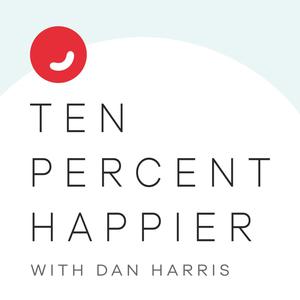 10% Happier with Dan Harris
10% Happier with Dan Harris
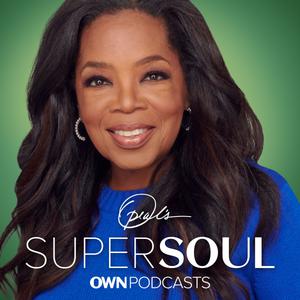 Oprah's Super Soul
Oprah's Super Soul
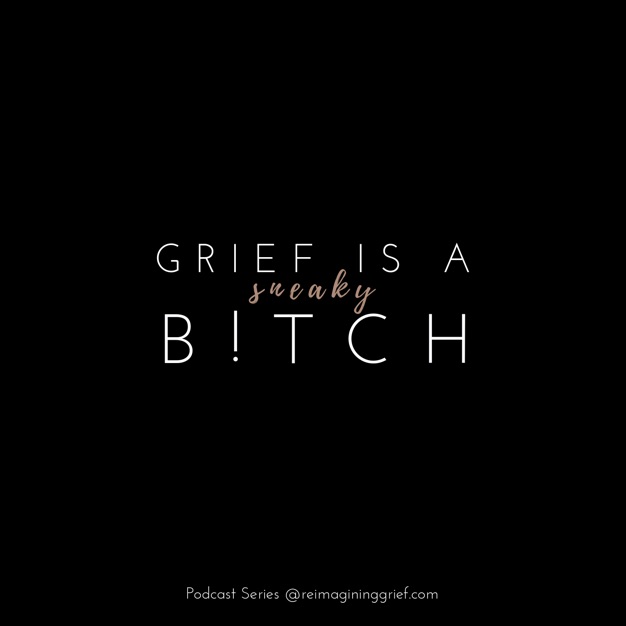 GRIEF IS A SNEAKY B!TCH
GRIEF IS A SNEAKY B!TCH
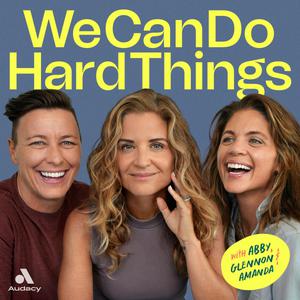 We Can Do Hard Things
We Can Do Hard Things
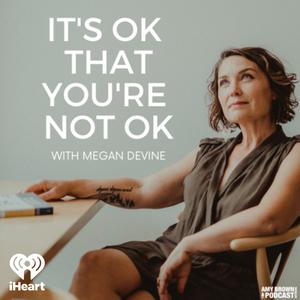 It’s OK That You’re Not OK with Megan Devine
It’s OK That You’re Not OK with Megan Devine
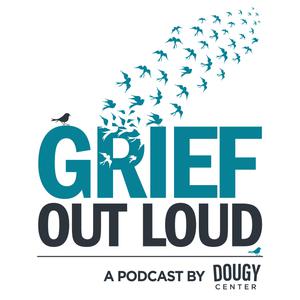 Grief Out Loud
Grief Out Loud